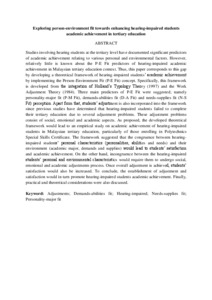Citation
Azizan, Che’ Rozaniza and Roslan, Samsilah and Chong Abdullah, Maria and Asimiran, Soaib
(2016)
Exploring person-environment fit towards enhancing hearing-impaired students academic achievement in tertiary education.
Journal of Education and Social Sciences, 4 (2).
pp. 62-68.
ISSN 2289-9855
Abstract
Studies involving hearing students at the tertiary level have documented significant predictors of academic achievement relating to various personal and environmental factors. However, relatively little is known about the P-E Fit predictors of hearing-impaired academic achievement in Malaysian tertiary education context. Thus, this paper corresponds to this gap by developing a theoretical framework of hearing-impaired students’ academic achievement by implementing the Person-Environment Fit (P-E Fit) concept. Specifically, this framework is developed from the integration of Holland’s Typology Theory (1997) and the Work Adjustment Theory (1984). Three main predictors of P-E Fit were suggested; namely personality-major fit (P-M Fit), demands-abilities fit (D-A Fit) and needs-supplies fit (N-S Fit) perception. Apart from that, students’ adjustment is also incorporated into the framework since previous studies have determined that hearing-impaired students failed to complete their tertiary education due to several adjustment problems. These adjustment problems consist of social, emotional and academic aspects. As proposed, the developed theoretical framework would lead to an empirical study on academic achievement of hearing-impaired students in Malaysian tertiary education, particularly of those enrolling in Polytechnics Special Skills Certificate. The framework suggested that the congruence between hearing-impaired students’ personal characteristics (personalities, abilities and needs) and their environment (academic major, demands and supplies) would lead to students’ satisfaction and academic achievement. On the other hand, incongruence between the hearing-impaired students’ personal and environmental characteristics would require them to undergo social, emotional and academic adjustments process. Once overall adjustment is achieved, students’ satisfaction would also be increased. To conclude, the establishment of adjustment and satisfaction would in turn promote hearing-impaired students academic achievement. Finally, practical and theoretical considerations were also discussed.
Download File
![[img]](http://psasir.upm.edu.my/54238/1.hassmallThumbnailVersion/Exploring%20person-environment%20fit%20towards%20enhancing%20hearing-impaired%20students%20academic%20achievement%20in%20tertiary%20education.pdf)  Preview |
|
Text
Exploring person-environment fit towards enhancing hearing-impaired students academic achievement in tertiary education.pdf
Download (75kB)
| Preview
|
|
Additional Metadata
Actions (login required)
 |
View Item |

